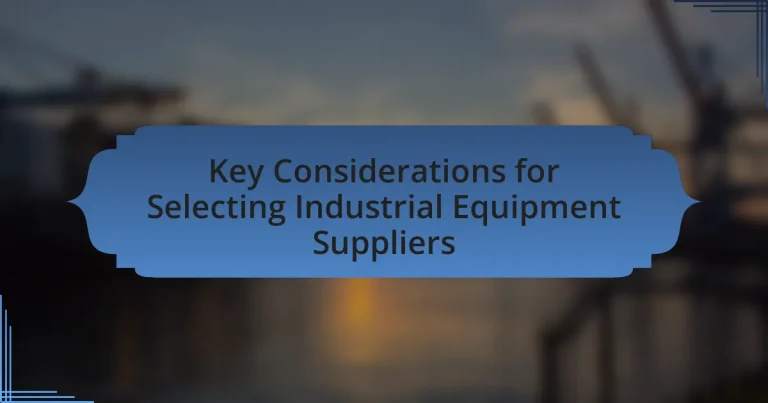The article focuses on the key considerations for selecting industrial equipment suppliers, emphasizing the importance of reliability, product quality, pricing, and customer service. It outlines the risks associated with choosing the wrong supplier, such as increased operational costs and compromised product quality, and highlights how the right supplier can enhance operational efficiency. The article also discusses essential criteria for evaluation, including supplier experience, reputation, financial considerations, and logistical factors, while providing best practices for a structured evaluation process to maintain quality and foster long-term partnerships.
What are the Key Considerations for Selecting Industrial Equipment Suppliers?

Key considerations for selecting industrial equipment suppliers include evaluating their reliability, product quality, pricing, and customer service. Reliability ensures that suppliers can consistently meet delivery schedules and fulfill orders, which is critical for maintaining production timelines. Product quality is essential, as high-quality equipment reduces downtime and maintenance costs; suppliers should provide certifications or warranties to validate their claims. Competitive pricing is important for budget management, but it should not compromise quality. Lastly, strong customer service facilitates effective communication and support, which is vital for resolving issues quickly. These factors collectively contribute to a supplier’s ability to meet the specific needs of industrial operations.
Why is it important to choose the right industrial equipment supplier?
Choosing the right industrial equipment supplier is crucial because it directly impacts operational efficiency, safety, and cost-effectiveness. A reliable supplier ensures high-quality equipment that meets industry standards, reducing the risk of equipment failure and associated downtime. For instance, according to a study by the National Institute of Standards and Technology, poor supplier selection can lead to a 20% increase in operational costs due to inefficiencies and maintenance issues. Therefore, selecting a reputable supplier not only enhances productivity but also contributes to long-term financial savings and operational reliability.
What risks are associated with selecting the wrong supplier?
Selecting the wrong supplier can lead to significant operational risks, including delays in production, increased costs, and compromised product quality. These risks arise because an unreliable supplier may fail to deliver materials on time, resulting in halted operations and missed deadlines. Additionally, poor-quality supplies can lead to defects in the final product, which can damage a company’s reputation and lead to financial losses. According to a study by the Institute for Supply Management, 43% of companies reported that supplier-related issues negatively impacted their business performance. This statistic underscores the critical importance of thorough supplier evaluation to mitigate these risks effectively.
How can the right supplier impact operational efficiency?
The right supplier can significantly enhance operational efficiency by providing high-quality materials and reliable delivery schedules. When suppliers consistently meet quality standards, production processes become smoother, reducing downtime caused by defective materials. Additionally, suppliers that adhere to timely delivery schedules ensure that operations are not interrupted, allowing for better inventory management and reduced holding costs. Research indicates that companies with strong supplier relationships experience up to 20% lower operational costs due to improved efficiency and reduced waste.
What criteria should be evaluated when selecting a supplier?
When selecting a supplier, key criteria to evaluate include quality, reliability, cost, and service. Quality refers to the standards of the products or services offered, which can be assessed through certifications and customer reviews. Reliability involves the supplier’s ability to deliver products on time and meet contractual obligations, often verified through performance history and references. Cost encompasses not only the price of goods but also total cost of ownership, including shipping and potential hidden fees. Service includes the level of support provided, such as responsiveness to inquiries and after-sales service, which can be gauged through customer feedback and service level agreements.
How does supplier experience influence selection?
Supplier experience significantly influences selection by establishing credibility and reliability in the eyes of potential buyers. Experienced suppliers often demonstrate a proven track record of delivering quality products, meeting deadlines, and providing effective customer service, which are critical factors in the decision-making process. For instance, a study by the Institute for Supply Management found that 70% of procurement professionals prioritize supplier experience when evaluating potential partners, indicating that a supplier’s history can directly impact their likelihood of being chosen.
What role does product quality play in supplier selection?
Product quality is a critical factor in supplier selection as it directly impacts the reliability and performance of the final product. High-quality products from suppliers ensure that the equipment functions effectively, meets industry standards, and reduces the likelihood of defects or failures. Research indicates that organizations prioritizing product quality in supplier selection experience lower operational costs and improved customer satisfaction, as evidenced by a study published in the Journal of Supply Chain Management, which found that 70% of companies reported enhanced performance when they focused on quality metrics during supplier evaluation.
How can supplier reputation affect the selection process?
Supplier reputation significantly influences the selection process by impacting perceived reliability and trustworthiness. A strong reputation often indicates consistent quality, timely delivery, and good customer service, which are critical factors for businesses when choosing suppliers. Research shows that companies are more likely to engage with suppliers who have positive reviews and a solid track record, as this reduces the risk associated with procurement decisions. For instance, a study published in the Journal of Supply Chain Management found that suppliers with high reputational ratings experienced a 20% increase in contract awards compared to those with lower ratings. This demonstrates that supplier reputation is a key determinant in the decision-making process for selecting industrial equipment suppliers.
What methods can be used to assess a supplier’s reputation?
To assess a supplier’s reputation, companies can utilize methods such as conducting background checks, analyzing customer reviews, and evaluating industry certifications. Background checks involve researching the supplier’s history, financial stability, and any legal issues, which provides insight into their reliability. Analyzing customer reviews on platforms like Trustpilot or Google Reviews offers direct feedback from previous clients, highlighting strengths and weaknesses. Evaluating industry certifications, such as ISO standards, indicates a supplier’s commitment to quality and adherence to best practices, further validating their reputation in the market.
How do customer reviews and testimonials contribute to supplier evaluation?
Customer reviews and testimonials significantly contribute to supplier evaluation by providing firsthand insights into the supplier’s reliability, product quality, and customer service. These reviews serve as a form of social proof, allowing potential buyers to gauge the experiences of previous customers, which can influence their purchasing decisions. For instance, a study by BrightLocal in 2020 found that 87% of consumers read online reviews for local businesses, indicating the importance of customer feedback in shaping perceptions. Additionally, consistent positive testimonials can enhance a supplier’s credibility, while negative reviews can highlight potential risks, thus aiding in informed decision-making during the supplier selection process.
What are the financial considerations in selecting a supplier?
Financial considerations in selecting a supplier include pricing, payment terms, and total cost of ownership. Pricing must be competitive and reflect the quality of goods or services offered, while payment terms should align with the buyer’s cash flow needs. Total cost of ownership encompasses not only the purchase price but also maintenance, operational costs, and potential downtime costs associated with the supplier’s products. According to a study by the Institute for Supply Management, 60% of procurement professionals prioritize total cost of ownership when evaluating suppliers, highlighting its significance in financial decision-making.
How should pricing structures be analyzed when choosing a supplier?
Pricing structures should be analyzed by comparing total costs, including base price, additional fees, and payment terms, to ensure a comprehensive understanding of the supplier’s financial implications. This analysis involves evaluating not only the initial price but also factors such as volume discounts, shipping costs, and potential hidden charges that could affect the overall expenditure. For instance, a supplier offering a lower base price may have higher shipping fees, which could negate the savings. Additionally, understanding payment terms, such as net payment periods or early payment discounts, can influence cash flow and overall cost-effectiveness. An effective analysis will lead to informed decisions that align with budgetary constraints and operational needs.
What are the implications of payment terms on supplier selection?
Payment terms significantly influence supplier selection by affecting cash flow management and overall financial risk. Suppliers offering favorable payment terms, such as extended payment periods or discounts for early payments, can enhance a buyer’s liquidity and reduce financial strain. Conversely, stringent payment terms may deter buyers from selecting a supplier, as they can lead to increased operational costs and cash flow challenges. Research indicates that companies often prioritize suppliers with flexible payment options, as these arrangements can facilitate smoother transactions and foster long-term partnerships.
What logistical factors should be considered when selecting a supplier?
When selecting a supplier, logistical factors such as transportation costs, delivery times, inventory management, and supply chain reliability must be considered. Transportation costs impact the overall expense of acquiring goods, while delivery times affect production schedules and customer satisfaction. Effective inventory management ensures that the supplier can meet demand without excessive stock, and supply chain reliability is crucial for maintaining consistent operations. According to a study by the Council of Supply Chain Management Professionals, 79% of companies report that supply chain reliability directly influences their operational efficiency, highlighting the importance of these logistical factors in supplier selection.
How does delivery time affect supplier choice?
Delivery time significantly influences supplier choice by impacting operational efficiency and customer satisfaction. Suppliers that offer shorter delivery times enable businesses to maintain lean inventory levels, reduce lead times, and respond quickly to market demands. According to a study by the Council of Supply Chain Management Professionals, timely delivery is a critical factor for 79% of companies when selecting suppliers, highlighting its importance in maintaining competitive advantage. Thus, businesses prioritize suppliers with reliable and prompt delivery schedules to enhance their overall supply chain performance.
What impact does location have on supplier selection?
Location significantly impacts supplier selection by influencing logistics, costs, and communication. Proximity to suppliers can reduce transportation expenses and lead times, enhancing supply chain efficiency. For instance, a study by the Institute for Supply Management found that 70% of companies prioritize local suppliers to minimize shipping costs and improve delivery times. Additionally, geographical location affects the ability to maintain close relationships and effective communication, which are crucial for collaboration and problem-solving. Thus, the strategic choice of supplier location can directly enhance operational performance and cost-effectiveness.
How can communication and support influence supplier selection?
Effective communication and support significantly influence supplier selection by fostering trust and clarity in the relationship. Clear communication ensures that both parties understand expectations, requirements, and timelines, which reduces the risk of misunderstandings that can lead to delays or quality issues. Additionally, strong support from suppliers, such as responsive customer service and technical assistance, enhances the buyer’s confidence in the supplier’s ability to meet their needs. Research indicates that companies prioritizing communication and support in supplier relationships experience higher satisfaction and better performance outcomes, as evidenced by a study published in the Journal of Supply Chain Management, which found that effective communication correlates with improved supplier performance metrics.
What are the key aspects of effective communication with suppliers?
The key aspects of effective communication with suppliers include clarity, consistency, and responsiveness. Clarity ensures that all parties understand expectations, specifications, and requirements, which minimizes misunderstandings and errors. Consistency in communication fosters trust and reliability, as suppliers can depend on regular updates and feedback. Responsiveness is crucial for addressing issues promptly, which helps maintain a smooth operational flow. Research indicates that companies with strong supplier relationships, characterized by effective communication, experience up to 20% lower costs and improved service levels, highlighting the importance of these aspects in supplier interactions.
How important is after-sales support in the selection process?
After-sales support is critically important in the selection process of industrial equipment suppliers. It directly influences customer satisfaction, operational efficiency, and long-term relationships. Research indicates that 70% of customers consider after-sales service as a key factor in their purchasing decisions, highlighting its role in ensuring equipment reliability and minimizing downtime. Furthermore, effective after-sales support can lead to repeat business and referrals, which are essential for supplier growth and reputation in the industry.
What are the common pitfalls to avoid when selecting a supplier?
Common pitfalls to avoid when selecting a supplier include inadequate research, overlooking supplier reliability, and failing to assess total costs. Inadequate research can lead to choosing a supplier without understanding their reputation or capabilities, which may result in poor service or product quality. Overlooking supplier reliability can cause disruptions in the supply chain, as unreliable suppliers may not meet delivery deadlines or quality standards. Failing to assess total costs, including hidden fees and long-term expenses, can lead to budget overruns and financial strain. These pitfalls can significantly impact operational efficiency and profitability, making thorough evaluation essential in the supplier selection process.
How can over-reliance on price lead to poor supplier choices?
Over-reliance on price can lead to poor supplier choices by causing organizations to overlook critical factors such as quality, reliability, and service. When companies prioritize the lowest price, they may select suppliers who cut corners on materials or processes, resulting in inferior products that can compromise operational efficiency. For instance, a study by the Institute for Supply Management found that 70% of procurement professionals reported that focusing solely on price led to increased costs in the long run due to quality issues and supply chain disruptions. This demonstrates that a narrow focus on price can ultimately harm an organization’s performance and profitability.
What are the dangers of neglecting supplier audits?
Neglecting supplier audits can lead to significant risks, including compromised product quality, financial losses, and damage to reputation. Without regular audits, companies may fail to identify non-compliance with industry standards, resulting in defective products that can harm end-users and lead to costly recalls. Additionally, financial risks arise from potential fraud or mismanagement within the supply chain, which can erode profit margins. A lack of oversight can also damage a company’s reputation, as customers increasingly demand transparency and accountability from suppliers. According to a study by the Institute for Supply Management, organizations that conduct regular supplier audits report a 20% reduction in supply chain disruptions, highlighting the importance of these evaluations in maintaining operational integrity.
What best practices should be followed for selecting industrial equipment suppliers?
To select industrial equipment suppliers effectively, prioritize evaluating their experience and reputation in the industry. Suppliers with a proven track record often demonstrate reliability and quality, which are crucial for operational success. Additionally, assess their product range and compatibility with your specific needs, ensuring they offer equipment that meets your technical specifications.
Furthermore, consider their customer service and support capabilities, as responsive suppliers can significantly impact your operations during equipment installation and maintenance. Financial stability is another critical factor; suppliers with solid financial health are less likely to face disruptions that could affect your supply chain.
Lastly, seek references and reviews from other customers to validate the supplier’s claims and performance. According to a study by the Institute for Supply Management, 70% of companies report that supplier reliability directly influences their operational efficiency, underscoring the importance of thorough supplier selection.
How can a structured evaluation process enhance supplier selection?
A structured evaluation process enhances supplier selection by providing a systematic framework that ensures consistency, objectivity, and thoroughness in assessing potential suppliers. This approach allows organizations to define clear criteria for evaluation, such as quality, cost, delivery performance, and service capabilities, which facilitates a more informed decision-making process. Research indicates that companies employing structured evaluation methods experience a 20% improvement in supplier performance metrics, as they can effectively compare suppliers against established benchmarks. By utilizing a structured process, organizations can minimize risks associated with supplier selection and foster long-term partnerships with reliable suppliers.
What role does ongoing supplier assessment play in maintaining quality?
Ongoing supplier assessment is crucial for maintaining quality as it ensures that suppliers consistently meet established standards and performance metrics. Regular evaluations allow organizations to identify potential issues early, such as deviations in product quality or service delivery, enabling timely corrective actions. For instance, a study by the Institute for Supply Management found that companies with robust supplier assessment processes experience 20% fewer quality-related defects. This proactive approach not only safeguards product integrity but also fosters continuous improvement and innovation among suppliers, ultimately enhancing overall supply chain performance.




